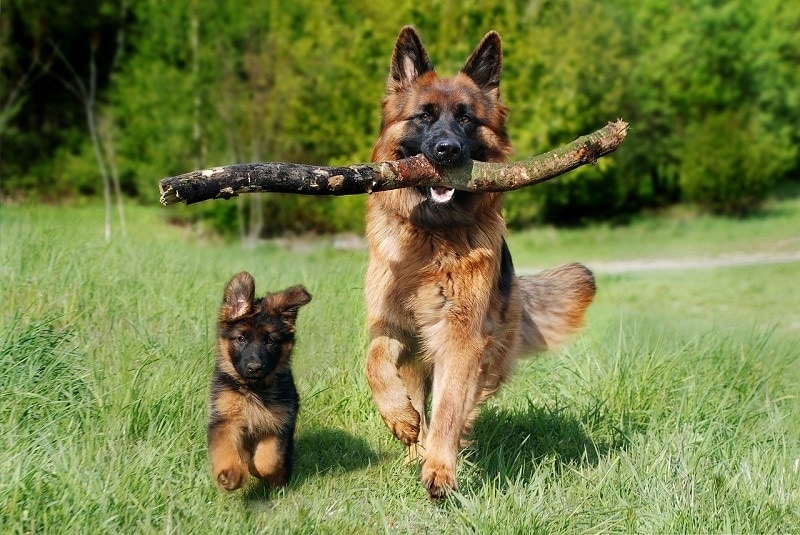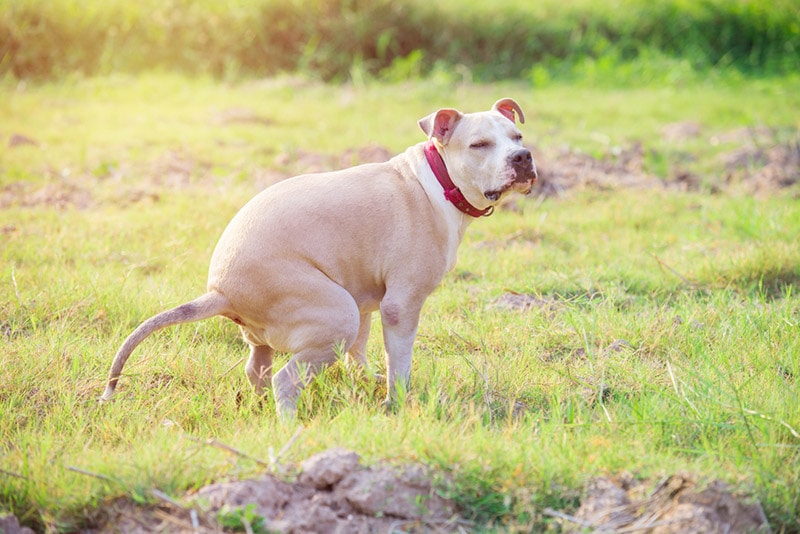English Shepherd vs Australian Shepherd: The Differences (With Pictures)
Updated on
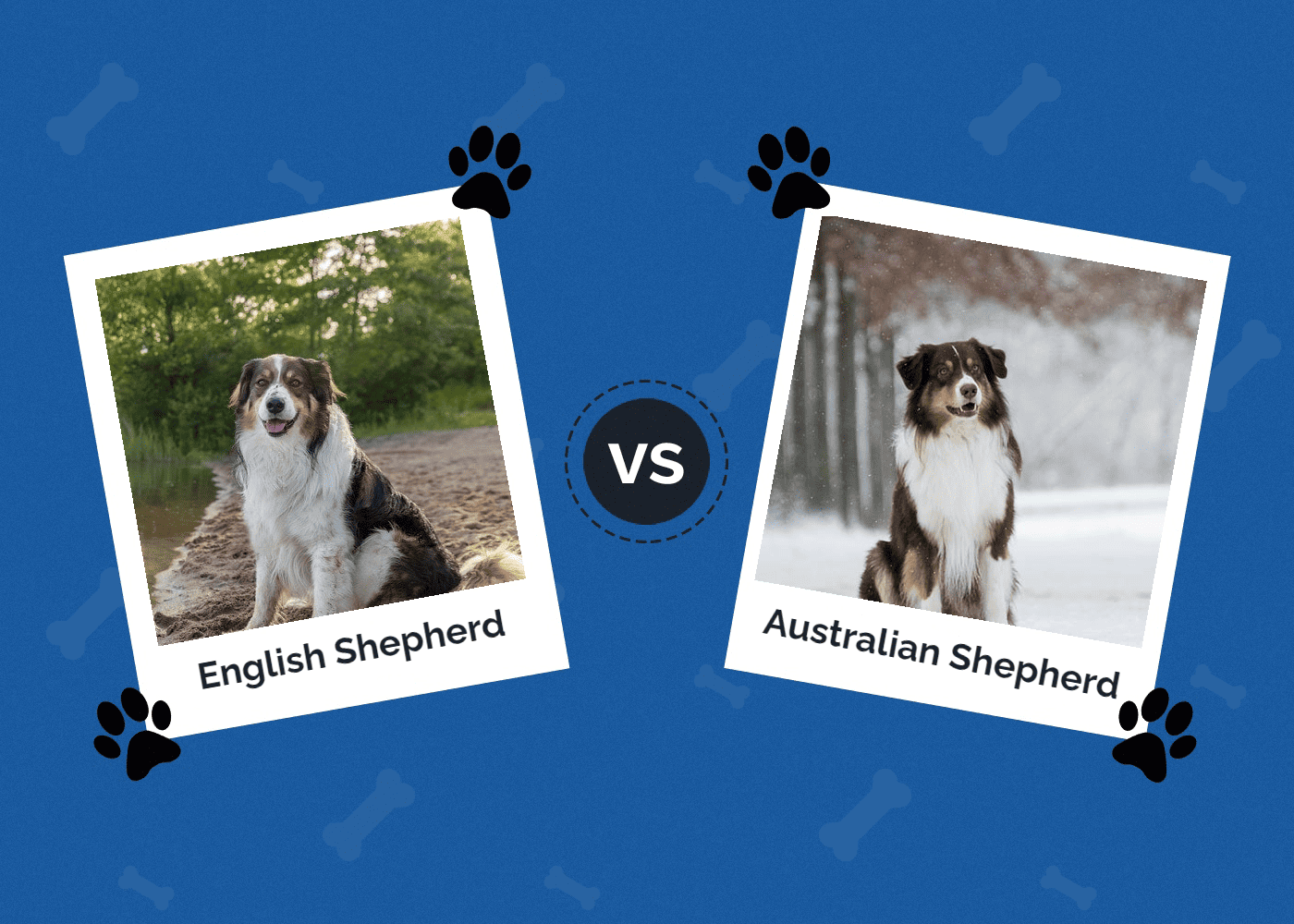
Click to Skip Ahead
If you’re looking for an intelligent, caring, and easily trainable dog, almost all shepherd breeds would be a great choice. That includes the English Shepherd and the Australian Shepherd, which are two dogs with enough similarities that they are often mistaken for being the same breed.
For example, both breeds are medium-sized, need lots of activity to stay healthy and happy, and are highly trainable working dogs that love to herd. However, while they have similarities, the Australian and English shepherds also have several differences. If you’re curious about those differences, you’re in luck!
Below you’ll find all the details on these wonderful dogs, including their grooming needs, personality, size, and much more. Read on to discover them all and get the necessary information before deciding which of these two dogs to adopt into your family.
Visual Differences

At a Glance
- Average height (adult): 19 – 21 inches
- Average weight (adult): 45 – 60 pounds
- Lifespan: 12 – 15 years
- Exercise: 1+ hours a day
- Grooming needs: Moderate. Brush once a week
- Family-friendly: Yes
- Other pet-friendly: Yes, mostly other dogs
- Trainability: Slightly stubborn but still relatively easy to train
- Average height (adult): 20 – 23 inches
- Average weight (adult): 50 – 65 pounds
- Lifespan: 13 – 15 years
- Exercise: 2+ hours a day
- Grooming needs: High. Brush 3+ times a week
- Family-friendly: Yes
- Other pet-friendly: Yes
- Trainability: Exceptionally easy to train
English Shepherd Breed Overview

English Shepherds are medium-sized, attractive, gentle, and highly intelligent. They make fantastic dogs for active families, do very well around children, and have few problems getting along with other pets. English shepherds are very protective of their families and occasionally have issues with strangers.
Personality / Character
English Shepherds aren’t dogs that like to snuggle and certainly won’t sit on your lap. That’s not to say that they aren’t affectionate, just that they would rather be busy working than relaxing. While they won’t cuddle, your English Shepherd will gladly stay by your side the entire day and follow you around while you do chores.
English Shepherds are one of the calmest dog breeds, have an even temper, and get along well with other pets. Once they’ve bonded with their family, English Shepherds will be loyal and protective for life. At the day’s end, they will gladly sit at your feet and relax with you.
Training
One of the English Shepherd’s most exemplary traits is their eagerness to please, making them easy to train. Add that to their high intelligence level, and training your English Shepherd should be a breeze with just a little diligence and daily practice. Their intelligence is so high that if you don’t take the time to train your English Shepherd well, there’s a good chance they will become destructive out of boredom.
What’s genuinely interesting about English Shepherds is their deep instinctual need to herd. If yours shows this trait strongly, it might need to be trained out of them, lest they start to herd your kids or other pets with too much forcefulness.

Health & Care
English Shepherds, overall, are a healthy breed that lives a long life in most cases. Like all dogs, however, they do suffer from several health problems that you should be aware of. For example, English Shepherds suffer more than most breeds from hip dysplasia, making walking painful as they age.
The same goes for a problem called luxating patella, where the patella bone in the knees pops out of place and causes discomfort. Collie eye abnormality is also a recurrent problem with English Shepherds. This disorder is an inherited one in which the blood vessels in the eye’s retina don’t develop correctly and can lead to blindness.
English Shepherds also need regular grooming for their long coats, including brushing at least twice a week, if not more. However, English Shepherds don’t need a lot of baths unless they’ve been playing in the mud or gotten into something dirty or gross. Too many baths can dry out and irritate their skin, which can lead to other health issues.
Exercise Needs
There are few dogs with the ridiculous abundance of energy you’ll find in an English Shepherd. This high energy level is one of the key facts you must understand before adopting one. You will need to give them many opportunities to exercise and get rid of all their energy.
You should also train your English Shepherd to help you in some way, shape, or form, as they live to help and will get bored if there’s nothing for them to do. Experts recommend at least 90 minutes per day of exercise for an English Shepherd.

Suitable For
While English Shepherds make excellent family dogs, they are more suited to younger, highly active adults who exercise outdoors frequently and can take their dogs with them. Older adults and those who don’t exercise often might not have the energy level needed to care for an English Shepherd correctly.
Young families make a great match as long as they are active and will take the time to exercise, train and care for their English Shepherd. Lastly, English Shepherds thrive when they have a routine they can follow daily. Once that routine is set, they will stick to it like glue (and make you stick to it also).
- Loyal
- Very protective of children
- Dedicated to any job they’re given
- Highly intelligent
- Easy to train
- Friendly
- Territorial if not socialized well
- Not a great apartment dog
- Needs many hours of exercise
- Shed heavily
Australian Shepherd Breed Overview
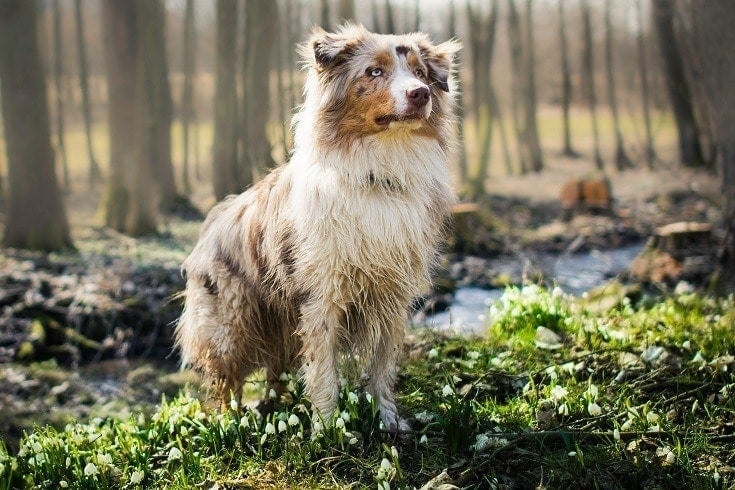
Like the English Shepherd, the Australian Shepherd is a medium-sized dog that’s highly intelligent, needs a lot of exercise, and makes a great family pet. One big difference, among several, is that Australian Shepherds need lots of space to run around and thus are best suited to farms and country living.
Personality / Character
Although they aren’t considered aggressive, Australian Shepherds are very protective of their family and will alert you if anyone they don’t know is approaching their territory. Like English Shepherds, the Australian Shepherd is eager to please, which makes them relatively easy to train.
Unlike their dog cousin, however, the Australian Shepherd will gladly play with children without trying to herd them. They also tend to pick one person they adore in the family and stay near that person the most.
Training
Training an Australian Shepherd should be #1 on your list if you adopt one as, without proper training, they will feel lost and inadequate and tend to become destructive. You must be consistent with your training, especially when your Australian Shepherd is a puppy, since they are prone to be defiant and stubborn.
This defiance must be trained out of them before they become an adult set in their ways. Treat training is recommended, although since Australian Shepherds are eager to please, it isn’t always necessary. Without treats, you will need to praise your Australian Shepherd profusely so they know you’re happy with their progress.
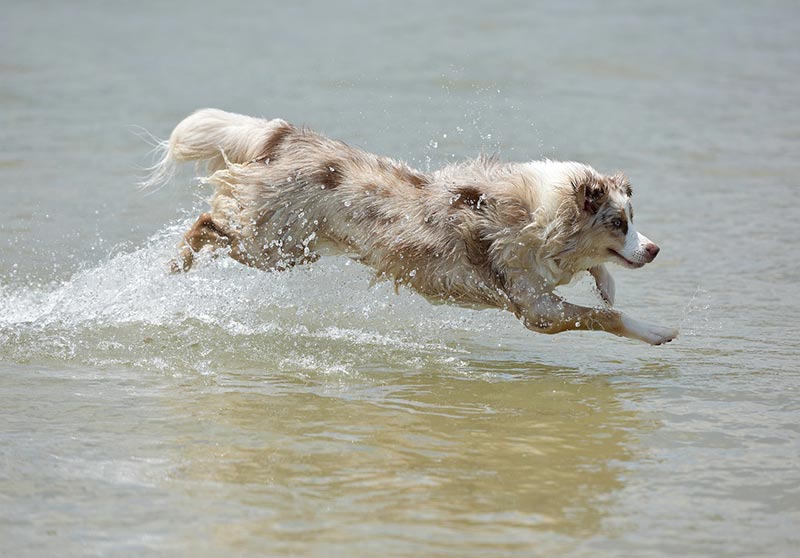
Health & Care
Like their English cousin, Australian Shepherds have a problem with collie eye abnormality and cataracts, making it imperative to adopt yours from a breeder who deeply cares about their dogs. The best breeders follow strict breeding policies and best practices to lower the risk of congenital health problems.
Unfortunately, Australian Shepherds also suffer from several types of cancer, and the number of them being diagnosed is increasing yearly. Hip dysplasia also affects an excessive number of Australian Shepherds, which is another reason to adopt your dog from an ethical breeder. Due to their enormous energy levels, Australian Shepherds also need dog kibble that provides plenty of high-quality protein and calories.
One major difference between Australian Shepherds and English Shepherds is the amount of grooming the former needs, which is considerably more than the latter. You will need to brush your Australian Shepherd several times a week to spread the natural oils found in their skin. Frequent baths are not needed, but they will require more brushing when they shed. An Australian Shepherd that lives indoors will shed less as it won’t need its heavy undercoat.
Exercise
Australian Shepherds need a lot of activity to stay happy and healthy, at least two hours a day and more if possible. Long walks are a requirement, and the ability to run around outside off of their leash is imperative.
You’ll find that a young Australian Shepherd will outrun, out-walk, and out-exercise you at every turn as their energy level is super high. If you can’t take your Australian Shepherd for long walks every day, you should at least have a large, fenced-in yard where they can run and play. The best situation, by far, would be to give them a job, which is why Australian Shepherds are perfect for farm life.
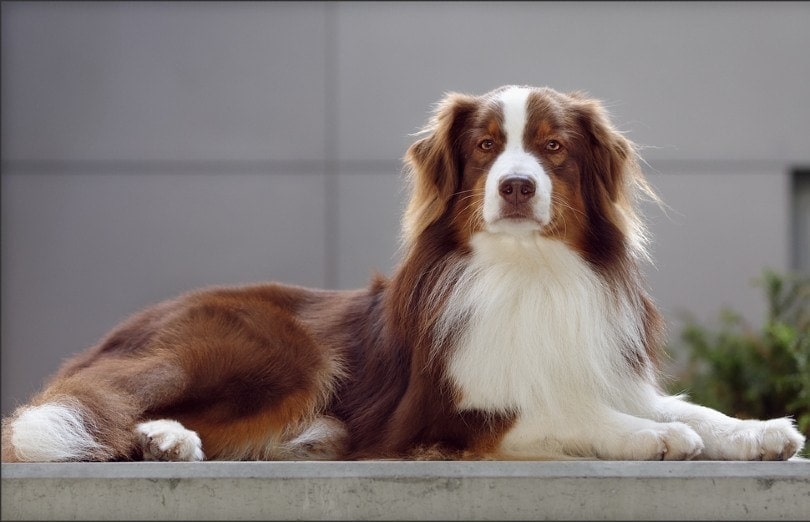
Suitable For
Australian Shepherds, like their English counterparts, are best suited for young families that can give them plenty of activity, from walking and running to herding and working. They don’t make great apartment dogs unless you can go outside and exercise with them often.
They also thrive when they can be with their humans all day. That makes them a great choice for a work-from-home pet parent or one that can take their Australian Shepherd with them on the job.
- Easy to train
- Wonderful personality
- Extremely loyal
- Protective but not aggressive
- Moderate grooming needs
- Get along well with other animals
- Love to exercise
- Need a very high amount of exercise
- Destructive if not given attention and activities
- Suffer inordinately from separation anxiety
- Higher incidence of eye health problems
The 4 Key Differences Between Australian Shepherds and English Shepherds
1. Dominance
English Shepherds are, in most cases, far more dominant than Australian Shepherds. They live to keep things in order and often display herding tendencies even if they aren’t trained to herd.
2. Grooming
The Australian Shepherd has a thicker, fluffier coat that needs quite a bit more grooming than the English Shepherd. English Shepherds have a soft coat, but it’s much thinner than the Aussie.
3. AKC Recognition
While the AKC recognizes the Australian Shepherd, they do not recognize the English Shepherd. However, both breeds are recognized by the United Kennel Club (UKC). If it’s important that your dog be recognized by the AKC, you should choose the Australian Shepherd over the English.
4. Training
The Australian Shepherd is considered easier to train, while the English Shepherd needs more time, patience, and diligence to train correctly. That’s because the English Shepherd is more willful and stubborn (not less intelligent).
Which Breed is Right for You?
The Australian Shepherd and the English Shepherd share many common traits. Both high-energy dogs need a lot of activity and exercise to thrive and be content.
They are also very intelligent and can be trained to do a wide variety of things, from working jobs to herding and much more than the usual dog tricks. Indeed, both breeds must be trained very well as, without proper training, they can tend to become bored, and their boredom will lead to destructive tendencies.
The biggest factor to consider when you adopt is how much space you can provide your new puppy. An English Shepherd would likely be best if you live in a typical home with a typical yard. For pet parents who have large yards, live in the country, or live on a farm, the Australian Shepherd would probably be a better choice, although an English Shepherd would also love living in those conditions. Both are best for younger families who will be able to match their energy level and provide more than enough activity and attention to keep them happy.
No matter which of these two wonderful dog breeds you adopt, you’ll be adding an intelligent, caring, devoted, and protective member to your family
Featured Image Credit: (L) Jennier McCallum, Shutterstock | (R) RebeccasPictures, Pixabay




